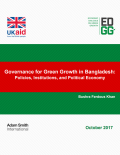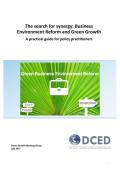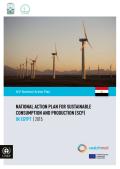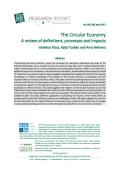

Business Environment Reform (BER) and Green Growth (GG) are both important parts of and strategies for sustainable development of emerging economies. While these two policy domains have their own core objectives and implementation strategies, there is a high potential for bringing out synergies but also to mitigate risks of trade-offs.
This practical guide is addressed to policy makers and development practitioners working on GG and BER. This purpose of this guide is to support program designers and managers at donor agencies, policy makers, development practitioners and evaluators in leveraging these synergies and avoiding trade-offs. The guide is meant for professionals working on BER and/or GG and those wishing to include elements and synergies in related policy areas.


Developing Sustainable Consumption and Production (SCP) National Action Plans (NAP) contributes to poverty alleviation, environmental sustainability and the development of a green economy. SCP-NAPs are the first step in a country’s response to 2015 adopted Sustainable Development Goals (SDGs) and in particular Goal 12: Ensure Sustainable Consumption and Production patterns.
Between January and November 2015, in a multi-stakeholder and inclusive process, Lebanon developed a national SCP Action Plan for the Industrial Sector to promote Sustainable Consumption and Production patterns, with a special focus on the Litani Basin and Qaraoun Lake. The SCP Action Plan for the Industrial Sector in Lebanon has identified 3 operational objectives: Adopt Best Available Techniques to promote SCP in the industrial sector; Introduce SCP approaches related to the industrial sector in the policy and institutional frameworks; Educate and raise awareness of consumers on SCP in the industrial sector.

Transforming the linear economy, which has remained the dominant model since the onset of the Industrial Revolution, into a circular one is by no means an easy task. Such a radical change entails a major transformation of our current production and consumption patterns, which in turn will have a significant impact on the economy, the environment and society. Understanding these impacts is crucial for researchers as well as for policy-makers engaged in designing future policies in the field. This requires developing an in-depth knowledge of the concept of the circular economy, its processes and their expected effects on sectors and value chains. This paper reviews the growing literature on the circular economy with the aim of improving our understanding of the concept as well as its various dimensions and expected impacts. On the basis of this review, it attempts to map the processes involved and their application in different sectors. The paper suggests that research on the circular economy is currently fragmented across various disciplines and there are often different perspectives and interpretations of the concept and the related aspects that need to be assessed.
